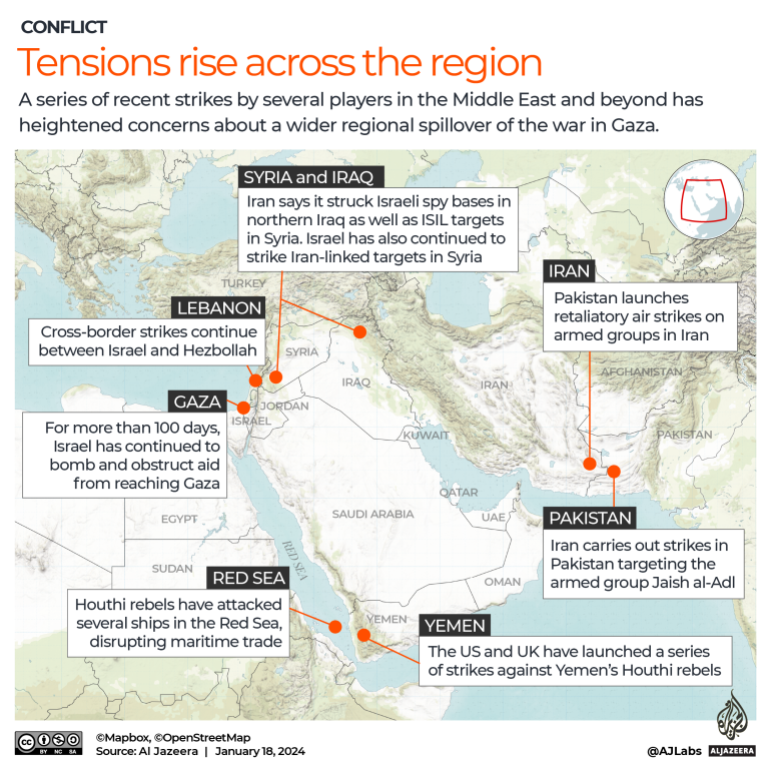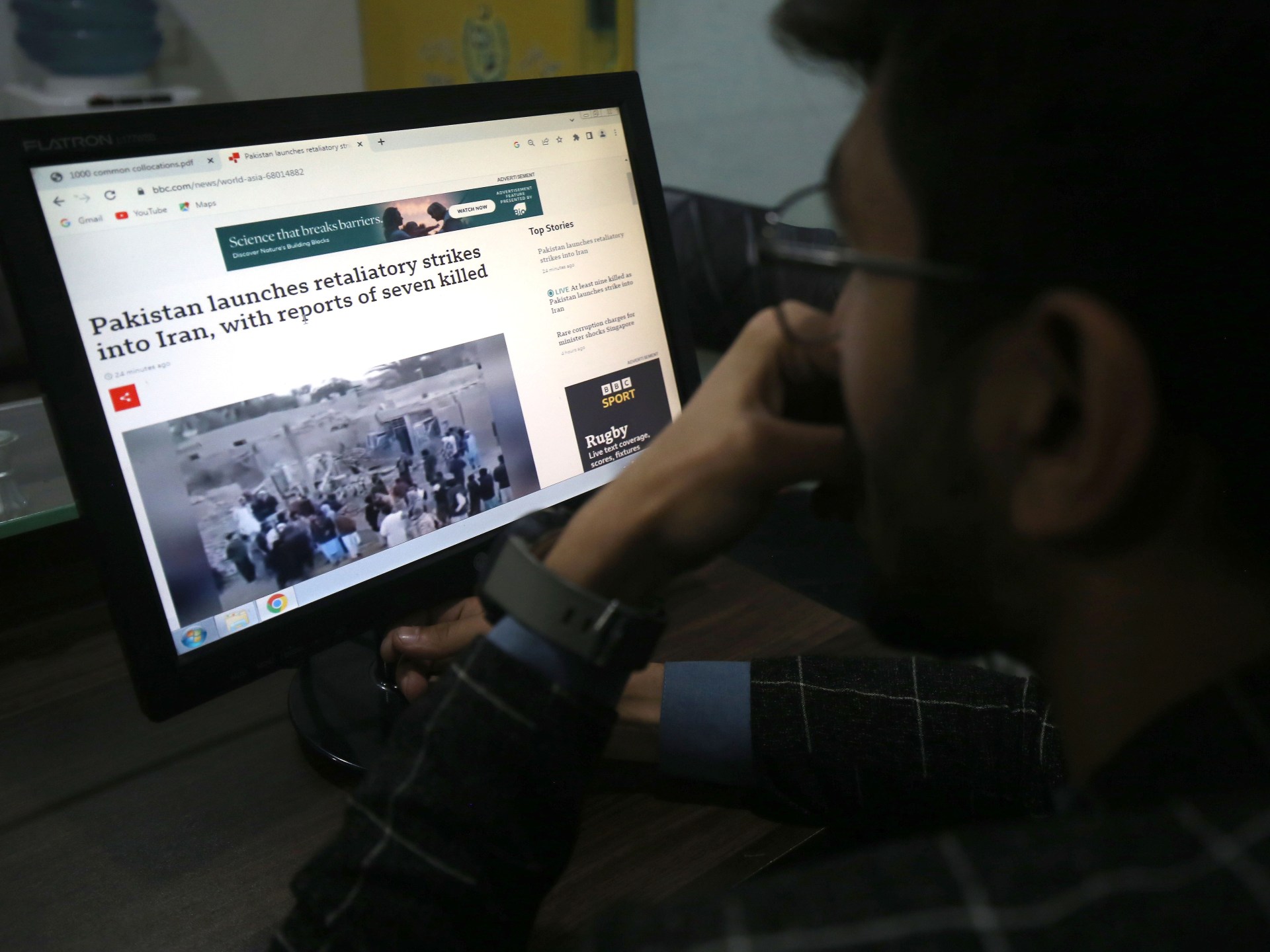Islamabad, Pakistan – Pakistan and Iran have agreed to de-escalate tensions after tit-for-tat navy strikes on one another’s territory this week, however the episode reveals an absence of belief between the neighbours that may proceed to plague relations even after the missiles and accusations have subsided, say analysts.
On Friday night Pakistan’s International Minister Jalil Abbas Jilani spoke to his Iranian counterpart Hossein Amirabdollahian. “The 2 international ministers agreed that working stage cooperation and shut coordination on counter terrorism and different points of mutual concern must be strengthened. Additionally they agreed to de-escalate the scenario,” a Pakistan international ministry assertion learn.
Late on Tuesday, Iran had performed missile and drone strikes in Pakistan’s Balochistan province, killing no less than two youngsters and injuring three. Tehran stated the uncommon border intrusion focused Jaish al-Adl, a Sunni Muslim armed group accused of assaults contained in the Iranian territory of Sistan-Baluchestan.
In fewer than 48 hours, Pakistan responded with “exact” navy strikes that killed no less than 9 individuals, together with 4 youngsters and three ladies. Iranian media studies, quoting state officers, stated these killed had been “non-Iranians”, implying they may have been Pakistani nationals.
The uncommon navy actions between the 2 nations threatened to escalate right into a broader battle in a area already on edge over Israel’s greater than three-month battle within the Gaza Strip.
Pakistani caretaker Prime Minister Anwaar-ul-Haq Kakar reduce quick his go to to Davos, Switzerland, the place he was attending the World Financial Discussion board. On Friday, he chaired a gathering of the Nationwide Safety Council to evaluation the safety scenario.
Because the United Nations and world powers urged restraint between the 2 Muslim-majority nations and their shut ally China supplied to mediate, Islamabad and Tehran toned down their rhetoric.
In an announcement on Friday, Iran’s Ministry of International Affairs referred to “the pleasant and brotherly authorities of Pakistan”. An identical assertion by Pakistan’s Ministry of International Affairs on Thursday stated Islamabad “absolutely respects the sovereignty and territorial integrity of the Islamic Republic of Iran”.
However embedded even in these reconciliatory statements had been indicators of the border tensions that linger between the neighbours, and that exploded within the type of missile assaults this week.
Iran’s Friday assertion stated that it anticipated Pakistan “to stick to its obligations in stopping the institution of bases and the deployment of armed terrorist teams on its soil”, calling the security of its residents “a pink line”. And Pakistan insisted it had struck targets in Iran “in pursuit of Pakistan’s personal safety and nationwide curiosity which is paramount and can’t be compromised”.

‘Reckless and feckless’
Analysts have questioned Iran’s motive behind conducting strikes inside Pakistan throughout Israel’s assault on Gaza, which has additionally concerned Iranian allies corresponding to Hezbollah in Lebanon and the Houthis in Yemen.
Joshua White, professor of worldwide affairs and a non-resident fellow on the Brookings Establishment suppose tank in the US, advised Al Jazeera that Iran and Pakistan have ample causes to de-escalate after the “uncommon strikes”.
“The fact is that each the governments deploy rhetoric about brotherhood when it fits them however are sometimes suspicious of the opposite’s motives. This can be a low-trust relationship, however neither Islamabad nor Tehran have a lot to achieve from seeing tensions escalate,” he stated.
Ali Vaez, Iran venture director on the Worldwide Disaster Group, added that the Iranian transfer towards Pakistan risked opening a brand new entrance towards a nuclear-armed neighbour.
“The strike was each reckless and feckless towards a nuclear state on whose cooperation Iran relies upon for reigning in armed Baloch teams – and a lethal message despatched to the improper handle – as a lot of the setbacks Iran has suffered up to now few weeks had been perpetrated by the hands of Israel, the US and the so-called Islamic State [ISIL/ISIS],” Vaez advised Al Jazeera.
Islamabad-based knowledgeable on safety points Syed Rifaat Hussain stated dialogue was vital for the 2 nations to revive belief.
“The conversations must occur between the 2 nations, they usually might be at both the navy stage or at civilian stage, however management will play an vital position in defusing the strain,” he advised Al Jazeera.
Hussain stated the unprovoked Iranian strike stays a thriller to him.
“The Iranian calculus is relatively complicated. Maybe Iran overplayed its hand. They thought Pakistan will take up the strike and can present restraint, or at most, a verbal protest,” he stated.
Vaez concurred, saying Iran “overreached” in its obvious must display energy.
“It left Pakistan able the place it had no choice apart from retaliating in sort to attract a pink line on unilateral Iranian strikes into its sovereign territory,” he stated.
Vaez puzzled if Iran’s determination to strike was guided by an “inner stress on the necessity to flex its navy muscle to discourage additional focused killings of its senior military commanders and strikes towards its allies within the area”.
“Plus, the Iranian authorities additionally appears eager to wag the canine, provided that it has parliamentary elections arising in six weeks amid a excessive diploma of political apathy,” he advised Al Jazeera.
White stated it’s unlikely that the Pakistan-Iran tensions will function considerably in US coverage in the direction of the 2 nations.
“I don’t suppose this episode will alter the US perspective in the direction of Iran or is prone to meaningfully change Washington’s engagement with Islamabad, both. American officers have lengthy seen Iran-Pakistan tensions within the Balochistan area as a posh however localised battle,” he stated.
Vaez stated neither Iran nor Pakistan seem serious about escalating tensions however added a phrase of warning contemplating the volatility within the area:
“This isn’t prone to escalate past a restricted tit for tat, however it’s a reminder of the elevated dangers of miscalculation within the fog of the Gaza battle that may unfold and escalate the battle additional.”

